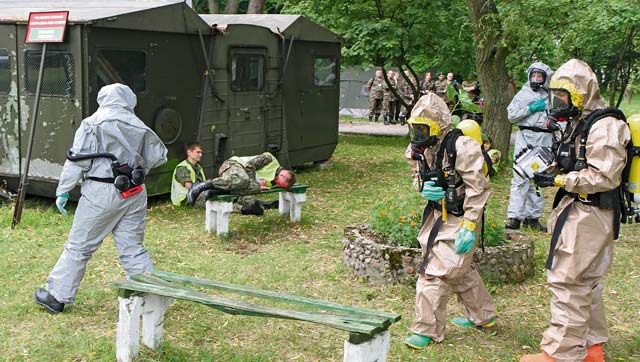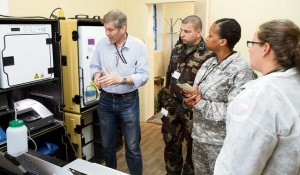
LODZ, Poland — Soldiers with the 773rd Civil Support Team, 7th Civil Support Command, traveled from Kaiserslautern to Lodz, Poland, June 24 to 28 to partake and assist in the Transatlantic Collaborative Biological Resiliency Demonstration BIOSAFETY 2013 workshop sponsored by the Defense Threat Reduction Agency and the Polish Epidemiological Response Center.
TaCBRD is a collaborative program between the U.S. Department of Defense, the U.S. Department of State the U.S. Department of Homeland Security and the program’s partner nation, the Republic of Poland.
Poland is one of our strategic partners, and we spend lots of time training with them to help build their capacity, said U.S. Army Lt. Col. Leslie M. Dillard, commander of the 773rd CST.
“As the only U.S. Chemical Biological Radiological Nuclear assets in Europe, it is imperative that we partner with all of the countries that we support,” she said.
The purpose of TaCBRD is to develop and demonstrate a capability for resilience in countering a wide area biological incident that impacts U.S. and partner nation civilian and military personnel and key infrastructure.
“TaCBRD is an opportunity for us in the science and technology community to have the ability to assess some of the prototype things that we have developed,” said U.S. Army Col. Ron Hann, acting director of DTRA’s Joint Science and Technology Office for Chemical and Biological Defense located at Fort Belvoir, Va.

“Poland is working on building their partnership capabilities and improving their bio-resiliency,” Hann said.
When asked why it is significant for the 773rd CST to participate in the workshop, Hann said, “The 773rd CST, if there would ever be an event in Europe, would be our rapid reaction force and provide U.S. Federal assistance (response) in another country.”
Participating with the 773rd CST were members of the 7th CSC headquarters, who attended to exercise their skill set as a joint task force consequence management element. Other organic 7th CSC units that participated were the 196th Medical Support Unit, the 361st Civil Affairs Brigade and the 209th Digital Liaison Detachment. Soldiers from the Illinois Army National Guard, including three Polish linguists and search and recovery teams, also participated.
“The Illinois (Army) National Guard has been involved with Poland for over 20 years,” Dillard said. “There is a longstanding relationship and understanding between the Illinois (Army) National Guard and Poland.”
This allows for the 773rd to be able to come in and merge with them, she added.
In order to prepare the participants for the workshops that took place during the week, multiple safety classes were given at the Military Medical Training Center June 24 by members of the Polish military, Hungarian military, French military, the FBI, and the U.S. Environmental Protection Agency.
“All of these instructors from different countries coming together and sharing what they had to offer was very productive, insightful and beneficial to the team,” said Capt. Hubert J. Little III, a medical operations officer for the 773rd CST.
Participants traveled to the Jezewo Training Area June 25 to 28 in order to put their skills and knowledge to use in workshop scenarios under the field conditions of a simulated biological terrorist attack. Here, members of the Polish Army and the 773rd CST, along with supporting elements, worked together to allow DTRA to observe partner nation collaboration with each scenario.
“The partnership that we have developed with our Polish partners has been very productive,” Little said. “A Polish officer from the hospital made sure that needed supplies or equipment were met.”
Teams from each country were partnered together according to their mission and abilities in order to conduct each scenario.
“When conducting the recon scenario, two Polish and two American members were sent out to the incident site,” said Sgt. Justin M. Ferris, a tactical operations center NCO for the Illinois ARNG 444th Chemical Company from Galesburg, Ill. “We were both on the same sheet of music when conducting the recon together.”
“When the teams are mixed, one member from Poland and one member from America, together we can still work on the mission because we have similar procedures,” said Polish 2nd Lt. Luke Romaniuk, a former resident of Lodz and an officer with the medical prevention team assigned to the Epidemiological Response Center of the Polish armed forces in Warsaw, Poland.
When asked about the advantages of working with a foreign country, Romaniuk said, “When we work with other countries, it allows for us to learn ways that may be better than ours and allows for us to change the way we do things in the future.”
“This has been a natural fit for us to come in as a CBRN element and assist in preparing the Poles for their assumption of mission,” Dillard said about the opportunity to be a part of TaCBRD and BIOSAFETY 2013.
“It has been a great opportunity for everybody involved on the U.S. side,” Dillard added.


